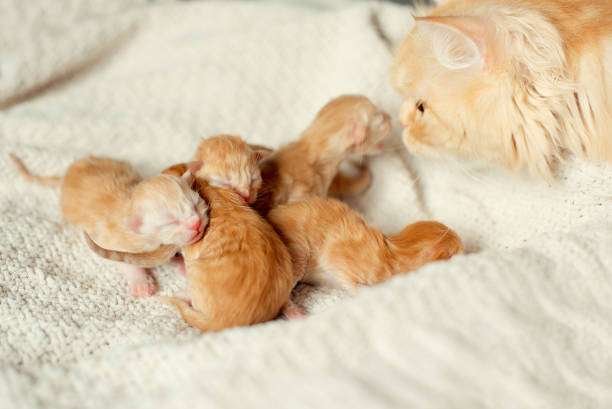If your cat has developed an unusual cough recently, you’re probably wondering why it’s happening and what you can do about it. While your cat’s coughing and wheezing can be hard to watch, it’s not uncommon in the feline realm and can often be a sign of a hairball your pet is trying to get rid of. However, a simple cough can quickly become more complicated when considering all the possible problems in the nose, throat, and lungs that can cause these symptoms. Even your cat’s heart may play a role. This means it’s best for the vet to diagnose your cat’s cough, but here are some possible reasons why your cat might be coughing while you wait for an appointment.
What are the Causes of Cat Coughing?
Cats Breathe air as we do, and any irritation of the respiratory organ from the nose down the windpipe into the lungs and bronchial tubes can cause a cough. While an occasional cough might not be alarming, repeated coughing often indicates a serious issue. Here are some common causes of cat coughing:
Respiratory Infections
Bacterial, viral, or fungal infections can irritate the respiratory tract and cause coughing. Symptoms may include fever, runny eyes, and nasal discharge. Respiratory infections can cause your cat to cough and wheeze. Viral, bacterial or fungal infections are common in cats and often come with lots of coughing, sneezing, sniffling and lethargy. Cats can also get cat flu, so if you notice a runny nose or a change in appetite, that could explain a sudden coughing fit.
Asthma
Asthma in cats can be triggered by environmental factors, causing their airways to narrow and swell, leading to coughing, wheezing, and sometimes open-mouth breathing. Feline asthma can be triggered by dust, smoke, or other allergens that cause airway inflammation when inhaled. Coughing is one of the main symptoms of feline asthma, but it’s usually not the only one. Wheezing, rapid breathing, vomiting, and lethargy are also signs that your cat is suffering from asthma.
Hairball
Cat hairballs are a natural consequence of your pet’s self-grooming habits. During grooming, cats swallow hair, which sometimes accumulates on their stomachs and forms hairballs. Cats usually try to eliminate hairballs by coughing, retching, and gagging to prevent them from causing an intestinal obstruction. If you’re wondering why your cat is coughing, it could be that they’re trying to get rid of a hairball.
Cancer
Cancer in cats can also affect their respiratory tract. Sometimes, tumors develop in the lungs, throat, or mouth, which triggers persistent coughing. Rapid breathing, lethargy, or coughing up blood are some of the common symptoms of lung cancer.
Pleural Effusion
This condition involves fluid surrounding the lungs, which can cause pressure and irritation, leading to coughing. It can result from infections, cancer, or other causes.
Inhaled Foreign Objects
Cats might inhale small objects like grass, which can get lodged in their respiratory tract and cause coughing, sneezing, or a bloody nose.
Pneumonia
Though less common, pneumonia can cause coughing, along with other symptoms like fever and lethargy. Feline pneumonia is a more serious cause of cat cough, and you should contact the vet immediately if your cat has trouble breathing, coughing, or has any discharge from the eyes or nose. Pneumonia is an inflammation of the lungs, usually due to an infection that causes fluid to build up inside the lungs. If left untreated, the lungs will fill with fluid instead of air, making it impossible for your pet to breathe.
Heartworms
Even a single heartworm can cause irritation in a cat’s chest, leading to coughing, though other forms of heart disease in cats typically do not.
Diagnosing Cat Coughing
If your cat is coughing, it is essential to identify the cause. Here are some steps for diagnosing the issue:
Video Evidence: If you notice your cat coughing, take a video of the behavior to show your veterinarian. This can help differentiate between coughing, retching, gagging, and reverse sneezing.
Veterinary Examination: Your vet will conduct a thorough examination, including asking about environmental factors and any other symptoms your cat is experiencing.
Laboratory Tests: Basic blood work, including a heartworm test, might be necessary to identify the cause of the cough.
Imaging: Chest radiographs (X-rays) are commonly used to get a better look at your cat’s lungs and airways.
Additional Testing: Depending on initial findings, further testing such as bronchoscopy or ultrasound might be recommended.
Treating Cat Coughing
Treatment for coughing in cats varies widely depending on the underlying cause:
Respiratory Infections: Antibiotics or antifungal medications might be prescribed for bacterial or fungal infections, respectively. Fortunately, a cat that is up to date on their vaccinations is less likely to get the flu. If you notice a stubborn, unusual cough in your pet, it’s always best to talk to your vet and rule out a respiratory infection.
Asthma
Although feline asthma cannot be cured. Treatment options include inhalers, injections, or oral medications to manage the condition and reduce inflammation. These treatments won’t make the underlying condition disappear but can help a struggling cat breathe normally again. Allergen testing is often recommended to narrow down the list of potential allergy triggers and minimize your pet’s exposure to them.
Hairball
it should not be more than once a month. If you notice an increasing frequency of coughing, retching, and gagging in your cat, you should see your vet to rule out other problems.
Pleural Effusion
Draining the fluid and treating the underlying cause, whether infection or cancer, is essential.
Foreign Objects
Removal of the object, either through sneezing/coughing or veterinary intervention, is necessary.
Cancer
Treatment might involve surgery, chemotherapy, or palliative care depending on the type and stage of cancer. As with any type of cancer, catching it early can increase the chances of a positive prognosis. Keep an eye out for any unusual changes in your cat’s behavior and symptoms and don’t hesitate to contact the vet.
Nasal Polyps
Surgical removal might be required to alleviate the symptoms.
Pneumonia
If you notice any unusual symptoms related to your cat’s breathing, it is extremely important to recognize the condition as an emergency and seek professional help as soon as possible. Treatment typically involves antibiotics and supportive care to manage symptoms.
Heartworms
Preventative measures are crucial, as treatment options for heartworm infection in cats are limited.
Preventing Cat Coughing
To reduce the risk of your cat developing a cough, consider the following preventive measures:
Regular Check-ups
Annual veterinary check-ups can help catch problems early before they become severe.
Vaccinations
Ensure your cat is up-to-date on vaccinations to prevent respiratory infections.
Parasite Control
Use heartworm prevention and other parasite control methods to protect your cat from infections that can cause coughing.
By understanding the potential causes, diagnostic steps, treatment options, and preventive measures, you can help ensure your cat remains healthy and free from persistent coughing. If you notice any unusual coughing behavior in your cat, consult your veterinarian for a thorough evaluation and appropriate treatment



